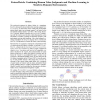Free Online Productivity Tools
i2Speak
i2Symbol
i2OCR
iTex2Img
iWeb2Print
iWeb2Shot
i2Type
iPdf2Split
iPdf2Merge
i2Bopomofo
i2Arabic
i2Style
i2Image
i2PDF
iLatex2Rtf
Sci2ools
AAAI
2015
2015
FutureMatch: Combining Human Value Judgments and Machine Learning to Match in Dynamic Environments
The preferred treatment for kidney failure is a transplant; however, demand for donor kidneys far outstrips supply. Kidney exchange, an innovation where willing but incompatible patient-donor pairs can exchange organs—via barter cycles and altruist-initiated chains—provides a life-saving alternative. Typically, fielded exchanges act myopically, considering only the current pool of pairs when planning the cycles and chains. Yet kidney exchange is inherently dynamic, with participants arriving and departing. Also, many planned exchange transplants do not go to surgery due to various failures. So, it is important to consider the future when matching. Motivated by our experience running the computational side of a large nationwide kidney exchange, we present FUTUREMATCH, a framework for learning to match in a general dynamic model. FUTUREMATCH takes as input a high-level objective (e.g., “maximize graft survival of transplants over time”) decided on by experts, then automatically...
| Added | 27 Mar 2016 |
| Updated | 27 Mar 2016 |
| Type | Journal |
| Year | 2015 |
| Where | AAAI |
| Authors | John P. Dickerson, Tuomas Sandholm |
Comments (0)

